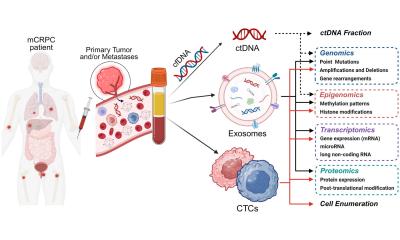PSA
A two-step biomarker approach for prostate cancer
Swiss researchers in Zurich and St Gallen have defined new biomarkers in patients' blood that indicate the presence of prostate cancer.
Prostate cancer is the most frequently diagnosed cancer in males in developed countries and the sixth leading cause of cancer death worldwide. One reason for the increase in diagnosis is the widespread uptake of the prostate-specific antigen (PSA) test, capable of detecting slow growing cancers that might otherwise go undetected.
Although PSA is the current standard biomarker to detect early prostate cancer, its lack of sensitivity and specificity leads to considerable over diagnosis and sometimes unnecessary treatment, making its effectiveness in systematic screening controversial.
A recent PNAS publication from Switzerland describes a new two-stage strategy corresponding to specific cancer-causing genetic mutations and the underlying disruption of signalling pathways to guide the discovery of novel serum biomarkers in application to prostate cancer.
The loss of tumour suppression leads to increased cell proliferation due to the loss of apoptosis (programmed cell death). Inactivation of the phosphatase and tensin homologue gene (PTEN) occurs in many cancers, especially glioblastoma, endometrial cancer and prostate cancer, and expression is reduced in other cancers, e.g. lung and breast. Up to 70% of men with prostate cancer have lost one copy of the PTEN gene. The Swiss researchers therefore considered it a good potential target for specific prostate cancer biomarkers. A well characterised consequence of PTEN inactivation is the constitutive aberrant activation of the phosphoinositide 3-kinase (PI3K) signalling pathway, a key regulator of numerous cellular processes in biology.
The first step was in an animal model, based on the supposition that PTEN loss will disrupt specific signalling pathway-activation pathways and the resulting changes in the surface and secreted proteins of the affected tissue (prostate) should be detectable as discrete biomarker in the serum. By comparing the serum of genetically modified mice, in which PTEN had been inactivated with wild-type controls, the researchers identified 126 different proteins. These became candidate biomarkers based on three criteria: PTEN dependency, prostate specificity and detectability in serum.
The second phase of the study examined tissue and serum samples, collected between 2004 and 2007, in men with prostate cancer or clinically confirmed benign prostatic hyperplasia (BPH). Using the information obtained from the mouse experiment, enrichment techniques were used to detect the glycosylated biomarkers specific to PTEN inactivation in both serum and prostate tissue. Building predictive models for the discrimination between normal and aberrant PTEN status, the group could identify a serum signature of four proteins that could correctly predict 78% of cases belonging to patients having aberrant or normal PTEN status with a sensitivity of 79.2% and specificity of 76.7%, and distinguish between prostate cancer and BPH. When used together with PSA, the resulting sensitivity was 85% with a specificity of 79%. This suggests these biomarkers are potentially suited for screening tests by reducing false-positives and therefore avoiding anxiety and biopsies in men who have an elevated PSA, but not cancer.
With further biomarkers it was also possible to draw conclusions about the progression rate of the cancer and therefore the best treatment options from other patterns of markers.
Such biomarkers have an important role to play in the development of personalised medicine and the authors feel that this method of biomarker discovery will be equally successful applied to other types of tumours.
20.04.2011











